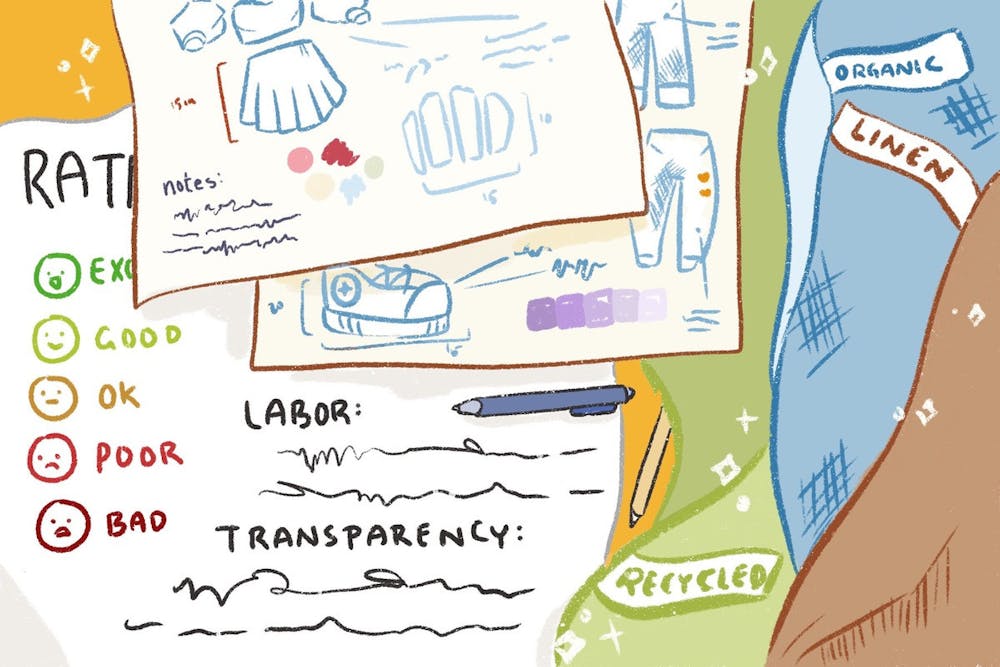Since its creation in 2010, Fashion@Brown has aimed to offer a “microcosm of the fashion industry” for its members, according to the group’s website. But in recent years, F@B has shifted away from focusing solely on broader fashion trends, stitching advocacy for fashion that is sustainable, conscious and ethical into the group’s core mission, co-presidents Kaila Zimnavoda ’24 and Natalia Brown ’23 told The Herald.
The Herald spoke to F@B directors, designers and partners, who discussed how Brown students are rethinking their relationships with fashion, clothing design and consumption.
Knitting sustainability into the mission
Brown traces back her interest in fashion to her mother. “I'm very inspired by my mom's fashion, so that's what brought me the industry,” she said. “I also really liked seeing the big flashy things that fashion has to offer.”
Influenced by her grandmothers and aunts, Zimnavoda's interest in fashion also started at an early age — and her love for fashion was ultimately what drew her to College Hill. “I actually applied to Brown because of Fashion@Brown,” Zimnavoda said.
F@B aims to highlight sustainability in its partnerships, working with groups such as Joluxe, “a fashion rental company which was founded to promote sustainability and accessibility in fashion,” according to the company’s website. According to Zimnavoda, F@B was responsible for the company's holiday shoot.
Ifeoma Azinge GS, founder of Joluxe, said the company was created “through the lens of how we can keep fashion alive and reduce waste while also making fashion more accessible.”
“When I was in college, I could not afford the types of things that would be more sustainable,” Azinge said. “Cost is a very big factor that plays into college students being involved in sustainability and fashion.”
By renting out sustainable clothing so that “someone else can also enjoy that piece,” Azinge also hopes to reduce fashion waste.
Azinge said she reached out to Fashion@Brown to get more involved with the student community on campus.
“Fashion@Brown is definitely playing their role in contributing to a more sustainable future in fashion and also helping the environment at the same time.”
Designing in shades of green
For Seabass Immonen ’23, one of F@B's design directors, his work is all about education. Beyond teaching technical skills, Immonen also helps lead sessions on the intersections between race, labor, sustainability and fashion, he said.
By sharing resources on how designers can reduce waste when developing their collections, F@B works to “make sure to talk about sustainability first of all,” he added.
In the studio that F@B uses at 50 John St., waste is also controlled carefully, Immonen said. “We have spare thread jars all over the place. … If (fabric) scraps are too small, they go in the scrap bin for recycling, and if they're big enough, we have a whole shelf of scrapped fabrics that are free for everyone to use,” he said. “We make sure that the waste we're producing is kept to a minimum.”
Americans threw out 17 million tons of used textiles in 2018, according to the Environmental Protection Agency.
Emma Zwall ’25, a designer for F@B, said that the scrap bins have inspired some of her work. "I honestly have been getting into messy fashion, so I've been including scraps in my clothes, which is really fun,” she said.
In the future, Zwall said she would like to see F@B create a “sustainability collection” made entirely of scraps.
“The fashion industry can be toxic, but the way that I found F@B is operated, it's just so different, and it's very refreshing,” said Shira Wolpowitz ’25, an F@B designer who recently designed a sustainability-focused collection using thrifted and secondhand materials. “We just have a practice of sharing materials and encouraging sustainability.”
Wolpowitz added that F@B should also consider how to further reduce waste from workshops. “It's important to supply those materials in order to teach people skills, but afterward it's not really like they're gonna do anything” with the materials, she said.
Challenging patterns
Despite F@B’s efforts, making sustainability a priority can prove challenging for a fashion organization, especially with comparatively limited resources and budget constraints, Brown and Zimnavoda said.
When it comes to ordering materials, the high prices of sustainable materials makes it difficult to cater to a large team of designers producing at the same time. While F@B aims to order materials from sustainable brands and companies, “the problem is that it ups the prices in a way that makes it unaffordable,” Zimnavoda said.
According to Immonen, F@B has partnered with FABSCRAP, a Brooklyn-based “textile reuse and recycling resource,” for recycling. While the partnership has financial support from the University for transporting materials to New York, Immonen noted that travel costs are high.
While F@B aims for sustainability, Immonen said it is important to look at the problem from a wider perspective.
“We're small compared to any other regular, actual industry player,” he said. “We know that the blame is really on the hundred companies that are responsible for 71% of the emissions and so on,” he said. “The best we can do is prepare people to know what's wrong after they leave here.”
Beyond F@B, Immonen believes that the larger University community should also strive to change its fashion habits. “The Brown community,” he said, “needs to do a lot more to shop less.”

Julia Vaz was the managing editor of newsroom and vice president on The Herald's 134th Editorial Board. Previously, she covered environment and crime & justice as a Metro editor. A concentrator in political science and modern culture and media, she loves watching Twilight (as a comedy) and casually dropping the fact she is from Brazil.





